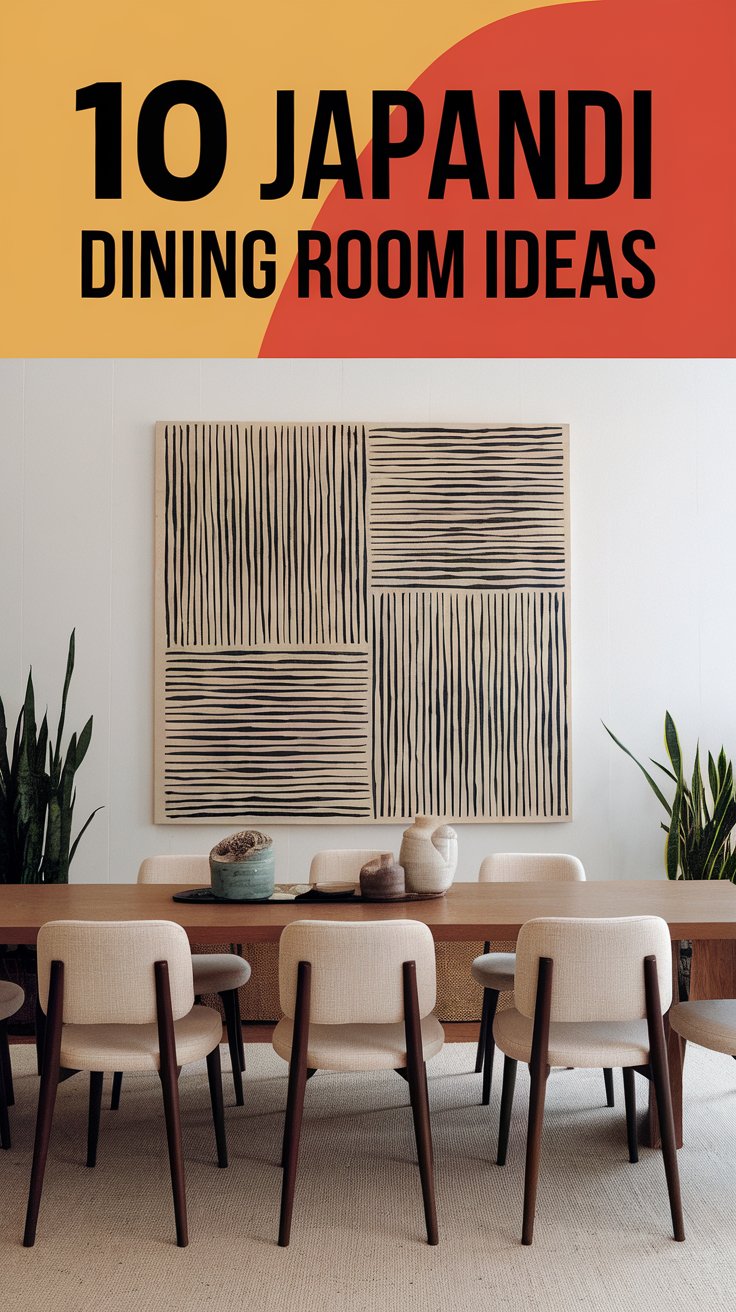10 Stunning Japandi Dining Room Ideas for a Harmonious Home
Japandi design, a fusion of Japanese minimalism and Scandinavian functionality, creates serene and inviting dining spaces. By incorporating natural materials, neutral colors, and thoughtful design elements, you can transform your dining area into a tranquil retreat. Here are ten inspiring ideas to help you achieve the perfect Japandi dining room.
- 1. Embrace Natural Wood Elements
- 2. Opt for a Neutral Color Palette
- 3. Incorporate Minimalist Furniture
- 4. Add Textural Contrast with Soft Furnishings
- 5. Utilize Sliding Doors or Screens
- 6. Choose Handmade Ceramic Dishware
- 7. Incorporate Indoor Plants
- 8. Install Pendant Lighting with Organic Shapes
- 9. Add Dark Accents for Depth
- 10. Incorporate Fluted Wood Details
- Helpful Resources
1. Embrace Natural Wood Elements
Utilize natural wood for furniture and accents to introduce warmth and texture. A wooden dining table with clean lines serves as a focal point, embodying the essence of Japandi design. Pair it with chairs featuring wooden frames to maintain a cohesive look.
2. Opt for a Neutral Color Palette
Choose soft, muted tones such as beige, gray, and off-white to create a calming atmosphere. These colors promote tranquility and allow natural materials to stand out. Incorporate darker accents sparingly to add depth and sophistication.
3. Incorporate Minimalist Furniture
Select furniture with simple, clean lines and functional designs. Low-profile dining chairs and benches enhance the minimalist aesthetic while providing comfortable seating. Consider pieces made from natural materials like wood, bamboo, or rattan to align with Japandi principles.
4. Add Textural Contrast with Soft Furnishings
Introduce texture through elements like linen tablecloths, woolen rugs, or cotton cushions. These additions add warmth and tactility, enhancing the dining experience without overwhelming the senses.
5. Utilize Sliding Doors or Screens
Incorporate sliding doors or shoji screens to subtly divide spaces while maintaining an open and airy feel. These features provide flexibility and can enhance the flow of natural light.
6. Choose Handmade Ceramic Dishware
Embrace the wabi-sabi philosophy by using handmade ceramics for dishware. The unique imperfections and textures of these pieces add character and align with the Japandi appreciation for artistry and simplicity.
7. Incorporate Indoor Plants
Bring nature indoors by adding potted plants or small trees. Plants introduce life and color, enhancing the connection to nature that is central to Japandi design.
8. Install Pendant Lighting with Organic Shapes
Opt for pendant lighting with soft, diffused light and organic shapes. Lighting fixtures made from natural materials like bamboo or rattan can enhance the warmth and texture of the space.
9. Add Dark Accents for Depth
Introduce dark accents, such as deep charcoal or matte black, to add sophistication and visual depth. These elements provide a striking contrast against light-toned woods and neutral palettes, creating a balanced and harmonious space.
10. Incorporate Fluted Wood Details
Integrate fluted wood details, such as vertical grooves on furniture or wall panels, to add subtle complexity and texture. This design feature highlights craftsmanship and adds visual interest while maintaining a minimalist aesthetic.
By thoughtfully combining these elements, you can create a Japandi dining room that is both functional and aesthetically pleasing, offering a serene space for gatherings and daily meals.
Helpful Resources
- https://edwardgeorgelondon.com/japandi-dining-room-designs/?utm_source=chatgpt.com
- https://japandistore.com/collections/japandi-table?utm_source=chatgpt.com
- https://hipandhome.com/japandi-dining-room?utm_source=chatgpt.com
- https://www.decorilla.com/online-decorating/japandi-living-room-dining-room-before-after/?utm_source=chatgpt.com
- https://www.home-designing.com/dining-room-interior-design-ideas-tips-photos/japandi-dining-room-2?utm_source=chatgpt.com

